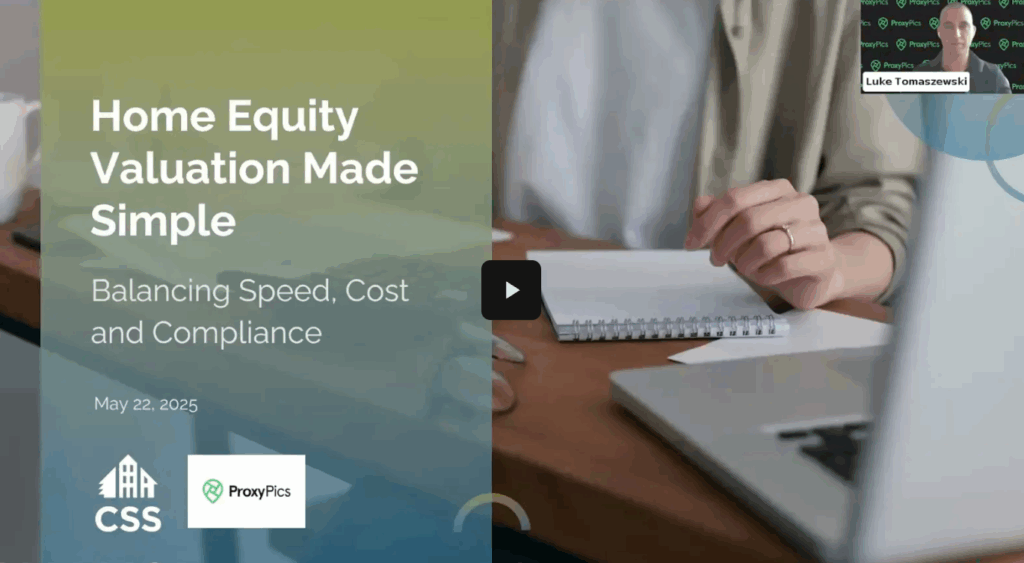Selecting the Right AVM Isn't Hard if You Know the Rules of the Road
The use of Automated Valuation Models (AVMs) has increased among lenders over the past few years as an efficient and cost-effective tool for home equity lending. According to the Mortgage Bankers Association (MBA), more than 75% of home equity loan and HELOC originations in 2023 used an (AVM) or Desktop Valuation (DV) method. With that increased popularity has also come increased regulatory scrutiny, particularly with ensuring accuracy and mitigating racial bias among AVM models. New guidelines that were launched in July of this year—Quality Control Standards for Automated Valuation Models—require lenders to “adopt policies, practices, procedures, and control systems to ensure that AVMs adhere to quality control standards designed to ensure the credibility and integrity of valuations.” Lenders have until next October to fully adopt the new rules which focus on testing and reviews as well as promoting compliance with applicable nondiscrimination laws.
As a result, lenders are looking to ensure they’re meeting—or will meet—the new guidelines and that the AVMs they’re using will deliver compliant results. The rules are clear, but the specific path to ensure compliance isn’t as clear, so, how does a lender select the right AVM in light of the new regulatory environment? Here are four best practices that lenders can follow to improve AVM accuracy, meet new regulatory guidelines and ensure compliance.
Recognize that with AVMs, it’s not one size fits all
Lenders should not assume that all AVMs are created equal or that one AVM model will suffice for all their needs. An AVM that works in one county with one type of lending product may not work across the board. Ideally, a lender should use an AVM that offers the ability to cascade through multiple models which take into account various factors that can influence accuracy such as geography, property type and price tier. The fact that AVM performance can vary significantly by county has been proven by third-party testing platforms such as AVMetrics which can identify and provide quarterly updates on the models that produce the best results in each county.
Perform ongoing accuracy testing
Testing AVM models is critically important not only to understand which AVM models work best in individual counties, but also as ongoing guideposts to check accuracy and provide regulatory coverage. Lenders should make sure their AVM models are regularly tested by an independent, third-party source. Not only will this enhance the performance and accuracy of the AVMs, it also provides regulators with proof that the lender is committed to AVM accuracy and does not have a conflict of interest in the testing results.
One key factor in testing: the AVM value on a property should be tested before the sale is made public. Otherwise, that public record data will be incorporated into the valuation, which, by definition, will skew the results and invalidate the test.
Stay on top of bias testing
An important goal of the new AVM guidelines is addressing the racial bias issue that has gained increased attention. Because AVMs do not rely on human perspective that is inherent in appraisals, they offer the benefit of an agnostic data-based valuation. Some lenders are using AVMs to supplement in-person appraisals as a way to mitigate bias from appraisers working in minority neighborhoods. That said, the data itself could be affected by bias which could, in turn, affect the AVM’s results. While the industry may currently lack a consistent standard for bias testing, AVM testing providers are making headway to address this critically important issue and lenders should be aggressive in implementing bias testing as it becomes available.
Match the valuation model to the loan product
AVMs are obviously useful valuation tools, but they may not suffice in all cases. For instance, they are not ideally suited for manufactured homes, due to insufficient public record data, or properties that have multiple parcels. Lenders should regularly evaluate their mix of valuation products to ensure they’re using the latest technology and that the solutions are the best fit with each of their loan products, geographic footprint, risk tolerance and other preferences. Because CSS is an agnostic provider of valuation services, we work with our lender clients to align their loans with the best valuation products that will deliver a high degree of accuracy, while still being conscious of cost and efficiency.
When using an AVM, we promote—and the regulatory guidelines do as well—the value of supplementing the AVM with a Property Condition Report (PCR). An AVM with an accompanying inspection will significantly enhance compliance adherence. Likewise, a property evaluation is an option in which a highly trained analyst can review the AVM, a PCR and public data to produce a very thorough report that emulates a drive-by appraisal with a comparison grid.
Further enhancing the accuracy of AVMs, many models offer confidence scores that indicate the accuracy of the output (this should be a high number) along with a forecasted standard deviation (this should be a low number), which indicates the value range for the result. Both of these provide additional data that let lenders decide whether or not to use the value to make a lending decision.
As AVMs continue to evolve to meet lender preferences and regulatory scrutiny increases the need to ensure accuracy and compliance, selecting the right AVM will require more due diligence. For more information on how to select the right AVM, please contact [email protected] .

Ashley is the CEO of CSS and oversees all aspects of the company’s strategy and operations.
Corporate Settlement Solutions is a single-source provider of real estate title, closing, valuation, flood and recording solutions.
Our team is highly engaged in delivering results that make our customers more efficient, effective, and profitable.
Contact [email protected] to get started!


